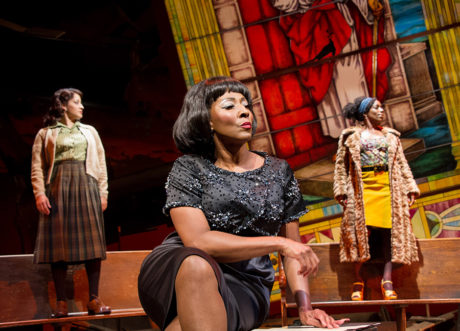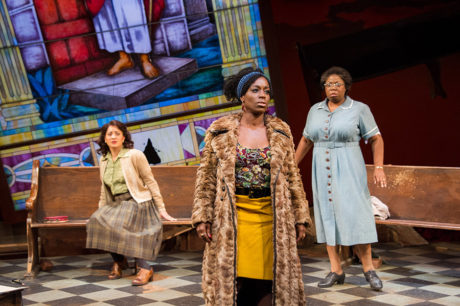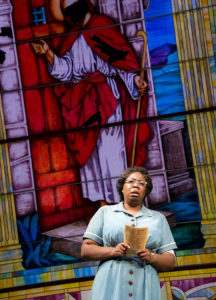After the Birmingham 16th Street Baptist Church bombing of 1963, Nina Simone turned her singing career toward the Civil Rights’ struggle. After a decade of singing mostly popular music, and building a substantial fan base, she had had enough; she was ready to take on the world.

Christina Ham’s Nina Simone: Four Women introduces us to that Simone: the activist, feminist, and cultural critic.
And Arena Stage most definitely has a hit: this show is guaranteed to rouse your soul and raise your mind.
In her song, “Four Women,” Simone introduces audiences to Aunt Sarah (Theresa Cunningham), Sephronia (Toni L. Martin), Sweet Thing (Felicia Curry), and Peaches, aka Nina Simone (Harriett D. Foy). These four racial-cultural archetypes highlight both Simone’s critical consciousness as well as her fiercely courageous desire for truth-telling.

In Ms. Ham’s play, these four women gather to struggle against and eventually for each other on the road to liberation.
Theresa Cunningham gives Sarah a steadfast honesty. Her deeply resonate voice embodies Sarah’s clarity of purpose:
My back is strong
Strong enough to take the pain
inflicted again and again
Toni L Martin lends Sephronia a lucid independence; she sings with certainty as her eyes dare you to defy her:
Between two worlds
I do belong
My father was rich and white
He forced my mother late one night
Sweet Thing is played by Felicia Curry, and she doesn’t tolerate challengers. Ms. Curry’s voice is as strong as her character’s will to survive;
Whose little girl am I?
Anyone who has money to buy
And then there is Harriett D. Foy, who gives Nina Simone fire and determination, so much so you most definitely don’t want to be standing in her way when her train comes rolling into town. Her voice and attitude are in perfect sync:
I’ll kill the first mother I see
my life has been too rough
I’m awfully bitter these days
because my parents were slaves
A combination of Simone originals, gospel, and popular songs, the play’s score focuses on a range of Simone’s musical identities. When Simone isn’t singing solo, these songs are sung by all four women: in both cases, they bring the house down.

This is particularly true with the emotional “Sinnerman,” one of the many highlights of the evening. Simone’s solo performance is special, but Four Women’s choral performance, complete with foot-stompingly ecstatic dance will turn your soul inside out.
Besides “Sinnerman” and “Four Women,” the ensemble gives us “Brown Baby,” while Simone does a fabulous rendition of “To Be Gifted Young and Black.”
And then, of course, there’s “Mississippi Goddamn,” the song that Simone wrote during the course of the performance; a song that was banned in many southern states.
Ms. Foy’s rendition of the song captures Simone’s rage over the death of Medgar Evers and the four young black girls in the Birmingham church bombing.
And the pain is not far behind:
Oh but this whole country is full of lies
You’re all gonna die and die like flies
I don’t trust you any more
You keep on saying ‘Go slow!’
‘Go slow!’
Ms. Ham’s dialogue brings that pain into full focus, and it is personal and prophetic.
Social change is indeed too slow for the people suffering under the wheel of political and economic oppression. But it’s not too slow because of the social damage that it does (even though that damage is great).
It’s too slow because of the psychological torment that contempt and pity bring to the oppressed.
Nina Simone is a welcome reminder that the strongest among us will never be strong enough to endure that pain forever.
You don’t have to live next to me
Just give me my equality
Everybody knows about Mississippi
Everybody knows about Alabama
Everybody knows about Mississippi goddam, that’s it
Nina Simone: Four Women is directed with subtlety and insight by Timothy Douglas, and with excellent musical direction by Darius Smith (who also plays Sam, the onstage piano player).
A truly marvelous set design by Timothy Mackabee highlights the action, while costumes by Kara Harmon present each of the ladies in just the right silhouette. Lights are by Michael Gilliam.
Running Time: One hour and 45 minutes, with no intermission.
Nina Simone: Four Women plays through December 24, 2017, in the Kreeger Theater at Arena Stage – 1101 Sixth Street, S.W., in Washington, D.C.For tickets, call (202) 488-3300, or purchase them online.




